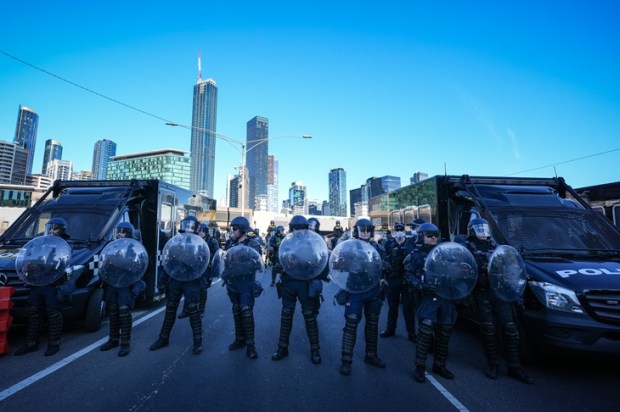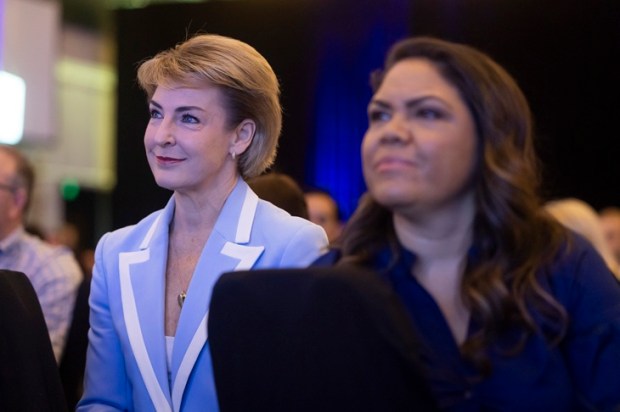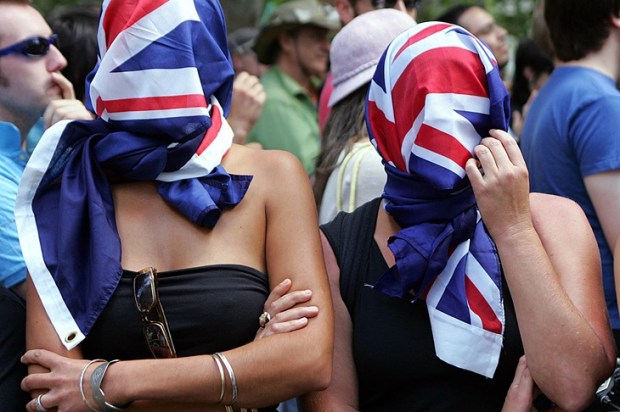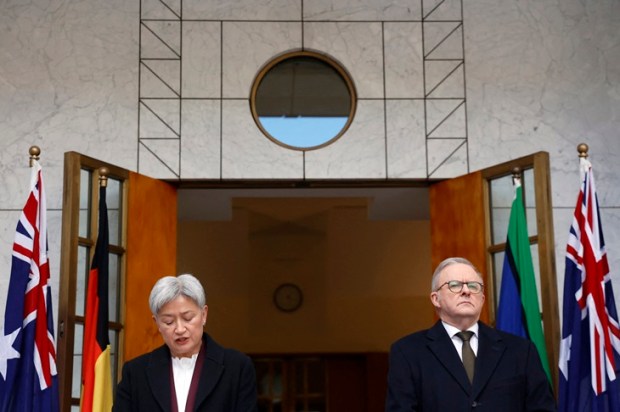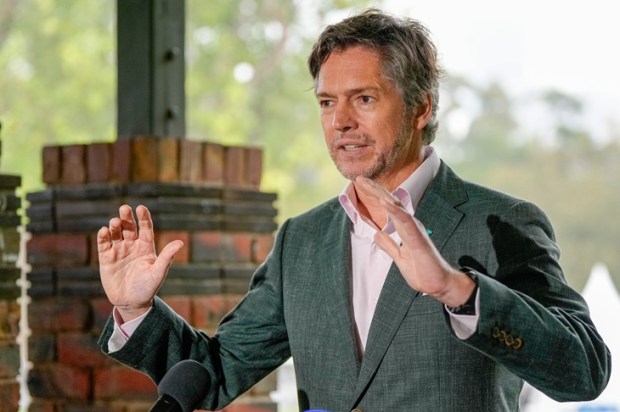The Coalition is facing extensive backlash following its decision to embrace Labor’s new hate speech laws.
Despite having some of the toughest restrictions against speech in the Western world, a ruthless eSafety Commission, and the frequently abused 18C legislation – hate speech and acts of violence are on the rise.
Australians understand this, but they are in no mood for further crackdowns on speech when the problem clearly sits elsewhere.
This is not the first time the Coalition have been called out for supporting anti-Liberal positions, and it seems their moderate-leaning broad church has an obsession with curtailing speech to enforce safety.
Nationals Senator Bridget McKenzie is often brought out as the defender of these unpopular positions, and she has done so again with an appearance on Sky News Australia on Sunday morning.
James Morrow asked the Senator: ‘I don’t know why we just can’t have more free speech in this country rather than narrowing what we can say every time there’s a problem.’
Senator Bridget McKenzie gave an awkward pause, staring down the lens of the camera. ‘Ah… James… We’re gonna have to uh still love each other but disagree on how this is rolled out. I-I love our country. I believe in free speech. Let’s be very clear here. It is not mosques that are being fire-bombed, it is synagogues.’
It’s also statues of Captain Cook and Australian war memorials…
During her explanation as to what these new laws would mean, the Senator said:
‘It means, essentially, that there will be no more Hezbollah flags being waved in our capital cities in those protest marches. Put your Hamas headbands away. They are absolutely going to be criminalised on the streets of Australia, as they should be.’
The last time terror-sympathisers were asked to put their flags away, they came back the next day with similarly coloured blank flags that represented the exact same ideology while skirting the edges of the law. What now, Senator?
Nobody on the panel asked the Senator about the logistics of the law, given there are thousands, if not tens of thousands, of people living in Australia who fly or have flown Hezbollah, Hamas, and other terror-related flags. What about those who shout the genocidal pledge, from the river to the sea… Are minimum jail sentences going to be enforced on all of them? Where would they be kept? It is more likely the law would incite these groups to flood the streets, empowering their hateful movement while exposing the government’s lack of power to protect Australia.
Intelligent leaders of the past knew better than to expose the law to public ridicule.
Despite the law being dangerously vague, it has been framed as a weapon to fight the recent violent attacks on the Jewish community.
As James Morrow points out, ‘All these things that we are taking about, the childcare centre [which was fire-bombed], they were already against the law … why do we need to do something like further limit speech broadly in this country, which was already very limited, lowering the bar for what is now a criminal offense, taking away provisions around even intent … all of our free speech rights, what is left of them in Australia, are getting further torched.’
After the Senator attempted to argue that the laws were about incitement not offence, Rita Panahi interrupted saying:
‘I’m not sure about that Bridget, because we have Christian schools warning that these laws will be used/weaponised against religious teachings. We have got others warning about a chilling effect on free speech. We already have laws against inciting violence … at what cost are we going to give up our right to free speech and to be able to have robust discussions … I don’t see how that is a Liberal value.’
The reason for this concern is because religion has been expanded to sex, sexual orientation, gender identity, intersex status, and disability. Which is a strange adjustment if this is meant to be about protecting the Jewish community from violent attacks.
Not only that, by adjusting advocate and intending that to read reckless as to whether in the text, the law now criminalises unintended consequences, which is insane. Incitement and accidental incitement are not the same thing. Go out and kill this person, my dear believers, and you will enter the gates of heaven is not the same thing as, God, this person is so annoying I wish they were dead.
‘Well Rita, I am going to have to disagree with you and the Coalition Senators and Members that voted for this bill also disagree because our advice is that the Criminal Code has very specific and agreed definitions around the use of the word violence,’ replied the Senator. ‘And that is that it refers specifically to physical violence. Now, I don’t think pulpits … I went to a Christian school, I don’t think my Christian teachers … would be inciting me to violence against others. We don’t want to see tenets of religious faith being minimised in their ability to be expressed. We want to be a religiously tolerant nation. We have a lot of different religions, but we don’t want pulpits or places of worship being used as a way to incite violence against fellow Australians.’
Her last comment appears to contradict her first statement. Whether or not pulpits are allowed to preach depends entirely on how incite is defined in practice. After all, most religious books contain incitement to violence against competing groups. There is a real danger that speakers are going to be held responsible for the criminal actions of individuals, instead of individuals being solely responsible for what they do.
Generally, there is a lot of confusion about the Coalition’s position on free speech in the lead-up to the election.
While opposing Labor’s Misinformation and Disinformation Bill, we heard grand speeches about the gifts of the Enlightenment. These were followed by awkward silences when it was pointed out that the Bill originated from the Coalition. Conservatives opposed 18C, but never made any serious attempts to get rid of it or use it as an election issue. They also championed banning those under 16 from social media, even though social media has been the largest driver of conservatism in the last few years and led to the election of Donald Trump.
As the ABC wrote a few days ago:
‘Before entering Parliament, James Paterson worked for the right-wing Institute of Public Affairs, which spearheaded attacks on 18C … now, as Shadow Home Affairs spokesman, Paterson has been at the forefront of the Opposition efforts to make the new hate speech law as strong as possible.’
The particular piece of legislation is being framed as a way to stop Nazi salutes and anti-Semitic attacks, but if that is its sole intention, then the law should be specific. It is not.
By refusing to explicitly confine itself to the violence between the Jewish and Islamic communities, the law leaves itself open to abuse, just as the Foreign Interference legislation was used to harass Tony Abbott and Nigel Farage for attending a CPAC conference when it was written to weed out CCP infiltration.
The hate speech laws that went through last week describe a wide scope:
‘These offences will protect groups, or members of groups, distinguished by race, religion, sex, sexual orientation, gender identity, intersex status, disability, nationality, national or ethnic origin, or political opinion.’
Will these laws arrest and imprison Indigenous protesters who wave signs that say, ‘pay the rent!’ or ‘the colonies must fall!’ or ‘watch out whites!’ What about those who decapitate the statues of our former Prime Ministers or those of historical figures such as Captain Cook?
We all know the answer to that.
It wasn’t so long ago that the red triangle of Hamas, a terror organisation, was unfurled over Parliament House.
Canberra cannot protect itself, let alone us.
It is indisputable that a rise in mass migration from wildly different cultures has led to civil tension. Australia, which used to carefully control its migration and championed assimilation and work ethic, broke its promise and its duty to the public all so that the Treasury could fudge growth numbers.
We have a hate speech crisis because Canberra used reckless migration to hide a recession.
Instead of policing speech, we should crack down politicians who have chosen to silence public criticism instead of addressing the policy errors that created an environment for hate speech to thrive.
Ironically, those who point out that it might not be the best idea for the safety of the Jewish community to import thousands of refugees from Palestine could find themselves in trouble even though it does not take a genius to work out that putting together two groups from a foreign war could end in disaster.
It is immensely unfair on the Australian population to be gaslit into thinking it is somehow their fault that this happening. Worse, Australians should not be losing their right to free speech because some people can’t leave their ancient grudges at the boarding gates.


